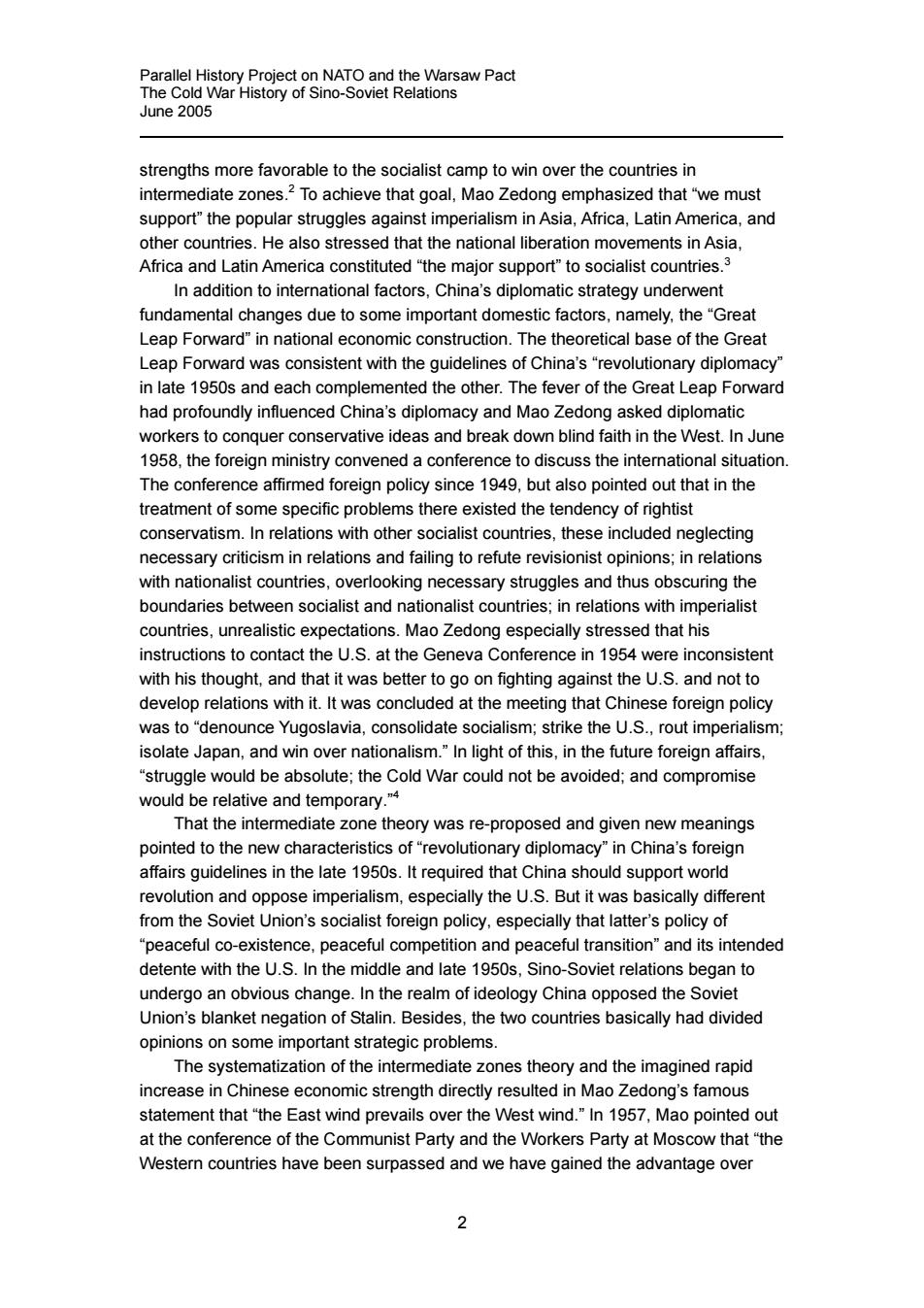正在加载图片...

Parallel History Project on NATO and the Warsaw Pact The Cold War History of Sino-Soviet Relations June 2005 strengths more favorable to the socialist camp to win over the countries in intermediate zones.2 To achieve that goal,Mao Zedong emphasized that"we must support"the popular struggles against imperialism in Asia,Africa,Latin America,and other countries.He also stressed that the national liberation movements in Asia, Africa and Latin America constituted"the major support"to socialist countries.3 In addition to international factors,China's diplomatic strategy underwent fundamental changes due to some important domestic factors,namely,the"Great Leap Forward"in national economic construction.The theoretical base of the Great Leap Forward was consistent with the guidelines of China's"revolutionary diplomacy" in late 1950s and each complemented the other.The fever of the Great Leap Forward had profoundly influenced China's diplomacy and Mao Zedong asked diplomatic workers to conquer conservative ideas and break down blind faith in the West.In June 1958,the foreign ministry convened a conference to discuss the international situation The conference affirmed foreign policy since 1949,but also pointed out that in the treatment of some specific problems there existed the tendency of rightist conservatism.In relations with other socialist countries,these included neglecting necessary criticism in relations and failing to refute revisionist opinions;in relations with nationalist countries,overlooking necessary struggles and thus obscuring the boundaries between socialist and nationalist countries;in relations with imperialist countries,unrealistic expectations.Mao Zedong especially stressed that his instructions to contact the U.S.at the Geneva Conference in 1954 were inconsistent with his thought,and that it was better to go on fighting against the U.S.and not to develop relations with it.It was concluded at the meeting that Chinese foreign policy was to"denounce Yugoslavia,consolidate socialism;strike the U.S.,rout imperialism; isolate Japan,and win over nationalism."In light of this,in the future foreign affairs, "struggle would be absolute;the Cold War could not be avoided;and compromise would be relative and temporary.4 That the intermediate zone theory was re-proposed and given new meanings pointed to the new characteristics of"revolutionary diplomacy"in China's foreign affairs guidelines in the late 1950s.It required that China should support world revolution and oppose imperialism,especially the U.S.But it was basically different from the Soviet Union's socialist foreign policy,especially that latter's policy of "peaceful co-existence,peaceful competition and peaceful transition"and its intended detente with the U.S.In the middle and late 1950s,Sino-Soviet relations began to undergo an obvious change.In the realm of ideology China opposed the Soviet Union's blanket negation of Stalin.Besides,the two countries basically had divided opinions on some important strategic problems. The systematization of the intermediate zones theory and the imagined rapid increase in Chinese economic strength directly resulted in Mao Zedong's famous statement that"the East wind prevails over the West wind."In 1957,Mao pointed out at the conference of the Communist Party and the Workers Party at Moscow that "the Western countries have been surpassed and we have gained the advantage over 2Parallel History Project on NATO and the Warsaw Pact The Cold War History of Sino-Soviet Relations June 2005 strengths more favorable to the socialist camp to win over the countries in intermediate zones.2 To achieve that goal, Mao Zedong emphasized that “we must support” the popular struggles against imperialism in Asia, Africa, Latin America, and other countries. He also stressed that the national liberation movements in Asia, Africa and Latin America constituted “the major support” to socialist countries.3 In addition to international factors, China’s diplomatic strategy underwent fundamental changes due to some important domestic factors, namely, the “Great Leap Forward” in national economic construction. The theoretical base of the Great Leap Forward was consistent with the guidelines of China’s “revolutionary diplomacy” in late 1950s and each complemented the other. The fever of the Great Leap Forward had profoundly influenced China’s diplomacy and Mao Zedong asked diplomatic workers to conquer conservative ideas and break down blind faith in the West. In June 1958, the foreign ministry convened a conference to discuss the international situation. The conference affirmed foreign policy since 1949, but also pointed out that in the treatment of some specific problems there existed the tendency of rightist conservatism. In relations with other socialist countries, these included neglecting necessary criticism in relations and failing to refute revisionist opinions; in relations with nationalist countries, overlooking necessary struggles and thus obscuring the boundaries between socialist and nationalist countries; in relations with imperialist countries, unrealistic expectations. Mao Zedong especially stressed that his instructions to contact the U.S. at the Geneva Conference in 1954 were inconsistent with his thought, and that it was better to go on fighting against the U.S. and not to develop relations with it. It was concluded at the meeting that Chinese foreign policy was to “denounce Yugoslavia, consolidate socialism; strike the U.S., rout imperialism; isolate Japan, and win over nationalism.” In light of this, in the future foreign affairs, “struggle would be absolute; the Cold War could not be avoided; and compromise would be relative and temporary.”4 That the intermediate zone theory was re-proposed and given new meanings pointed to the new characteristics of “revolutionary diplomacy” in China’s foreign affairs guidelines in the late 1950s. It required that China should support world revolution and oppose imperialism, especially the U.S. But it was basically different from the Soviet Union’s socialist foreign policy, especially that latter’s policy of “peaceful co-existence, peaceful competition and peaceful transition” and its intended detente with the U.S. In the middle and late 1950s, Sino-Soviet relations began to undergo an obvious change. In the realm of ideology China opposed the Soviet Union’s blanket negation of Stalin. Besides, the two countries basically had divided opinions on some important strategic problems. The systematization of the intermediate zones theory and the imagined rapid increase in Chinese economic strength directly resulted in Mao Zedong’s famous statement that “the East wind prevails over the West wind.” In 1957, Mao pointed out at the conference of the Communist Party and the Workers Party at Moscow that “the Western countries have been surpassed and we have gained the advantage over 2